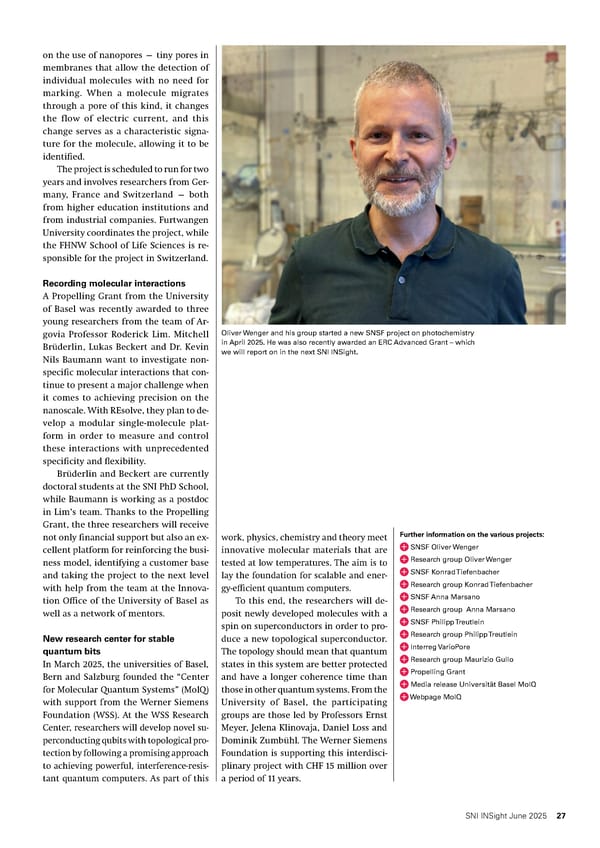on the use of nanopores — tiny pores in membranes that allow the detection of individual molecules with no need for marking. When a molecule migrates through a pore of this kind, it changes the flow of electric current, and this change serves as a characteristic signa- ture for the molecule, allowing it to be identified. The project is scheduled to run for two years and involves researchers from Ger- many, France and Switzerland — both from higher education institutions and from industrial companies. Furtwangen University coordinates the project, while the FHNW School of Life Sciences is re- sponsible for the project in Switzerland. Recording molecular interactions A Propelling Grant from the University of Basel was recently awarded to three young researchers from the team of Ar- govia Professor Roderick Lim. Mitchell Brüderlin, Lukas Beckert and Dr. Kevin Nils Baumann want to investigate non- specific molecular interactions that con- tinue to present a major challenge when it comes to achieving precision on the nanoscale. With REsolve, they plan to de- velop a modular single-molecule plat- form in order to measure and control these interactions with unprecedented specificity and flexibility. Brüderlin and Beckert are currently doctoral students at the SNI PhD School, while Baumann is working as a postdoc in Lim’s team. Thanks to the Propelling Grant, the three researchers will receive not only financial support but also an ex- cellent platform for reinforcing the busi- ness model, identifying a customer base and taking the project to the next level with help from the team at the Innova- tion Office of the University of Basel as well as a network of mentors. New research center for stable quantum bits In March 2025, the universities of Basel, Bern and Salzburg founded the “Center for Molecular Quantum Systems” (MolQ) with support from the Werner Siemens Foundation (WSS). At the WSS Research Center, researchers will develop novel su- perconducting qubits with topological pro- tection by following a promising approach to achieving powerful, interference-resis- tant quantum computers. As part of this Oliver Wenger and his group started a new SNSF project on photochemistry in April 2025. He was also recently awarded an ERC Advanced Grant – which we will report on in the next SNI INSight. Further information on the various projects: SNSF Oliver Wenger Research group Oliver Wenger SNSF Konrad Tiefenbacher Research group Konrad Tiefenbacher SNSF Anna Marsano Research group Anna Marsano SNSF Philipp Treutlein Research group Philipp Treutlein Interreg VarioPore Research group Maurizio Gullo Propelling Grant Media release Universität Basel MolQ Webpage MolQ work, physics, chemistry and theory meet innovative molecular materials that are tested at low temperatures. The aim is to lay the foundation for scalable and ener- gy-efficient quantum computers. To this end, the researchers will de- posit newly developed molecules with a spin on superconductors in order to pro- duce a new topological superconductor. The topology should mean that quantum states in this system are better protected and have a longer coherence time than those in other quantum systems. From the University of Basel, the participating groups are those led by Professors Ernst Meyer, Jelena Klinovaja, Daniel Loss and Dominik Zumbühl. The Werner Siemens Foundation is supporting this interdisci- plinary project with CHF 15 million over a period of 11 years. 27 SNI INSight June 2025
 SNI Insight - 2025 June Page 26 Page 28
SNI Insight - 2025 June Page 26 Page 28